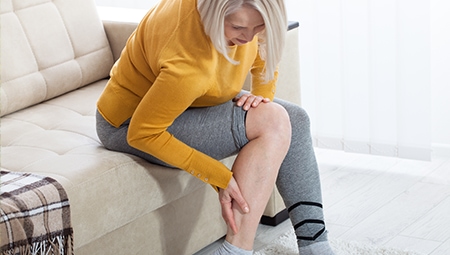
Symptoms of RLS, or Restless Leg Syndrome, can be managed at home with some simple treatments.
By Dr. Robert Rosenberg, Medical Advisor to SoClean
If you suffer from Restless Leg Syndrome (RLS), you know how uncomfortable it can be. In addition to the discomfort, RLS can sabotage your sleep habits and harm your quality of life. Not getting enough sleep affects your energy levels, your mood—even your overall health. The good news: the symptoms of RLS are treatable and manageable. There are a number of at-home remedies which have been successful at reducing the impact of RLS symptoms in patients all over the world. Learning more about at-home treatment options for RLS is the first step in taking action to prioritize your health and comfort.
What is RLS (Restless Leg Syndrome)?
RLS is a common disorder that causes an uncomfortable sensation in the extremities, usually the legs. If you have RLS, you know what it feels like: a tingly, crawly feeling in your legs that’s so uncomfortable, you need to move it. Between 3 and 15% of the population experience RLS, and the disorder is more common in women, especially pregnant women, and increases with age.[1] Symptoms are often felt more frequently in the evening and disrupt sleep. Over time, and if left untreated, RLS can result in physical and emotional consequences caused by sleep deprivation.
Around 40% of RLS patients[2] have a family history of the disorder, making it likely that the disorder is passed down genetically.[3] RLS has also been associated with a variety of other illnesses, like Parkinson’s, fibromyalgia, multiple sclerosis, and chronic renal disease. Some medications for psychiatric conditions or gastrointestinal diseases can also make RLS symptoms worse.
How RLS Impacts Sleep
RLS disrupts sleep and interferes with patients getting the rest and recuperation that their bodies need. Patients often experience sleep deprivation, insomnia, excessive daytime sleepiness, and exhaustion.[4] These harmful patterns can interrupt your daily routine, get in the way of your work or school productivity, and affect your relationships with your partner or loved ones. Over time, sleep deprivation can cause long-term health issues like high blood pressure, diabetes, heart attack, or even stroke.[5]
Although it may be tempting to self-medicate, over-the-counter sleep aids can sometimes exacerbate the symptoms of RLS due to the older antihistamines. It’s better to try some natural home remedies to reduce the impact of RLS on sleep.
Home Remedies for RLS to Try at Home
- Iron supplements. Studies have shown that iron deficiency may be linked to Restless Leg Syndrome.[6] Making sure to get enough iron may help reduce symptoms of RLS.[7]
- Vitamin D. Research has shown that vitamin D deficiency may be associated with RLS.[8] Vitamin D supplements may help relieve symptoms—even just getting outside and soaking up some sun is a good first step.[9]
- Massage. Try massaging your legs or having a partner massage them for you.[10] If it helps you relax, you can also take a bath and lightly massage your legs. Research has shown that massage can help manage the symptoms of RLS, potentially due to the dopamine released and improved circulation.[11]
- Weighted blankets. Use a weighted blanket to relieve symptoms of restless legs. The light pressure can bring your focus to the feeling of weight from the blanket, rather than on the tingling sensation.[12] Weighted blankets can also provide a sense of comfort that reduced anxiety, which has been correlated with RLS.[13]
- Exercise. Research shows that people with RLS who exercise experience fewer symptoms.[14] One study showed that women who practiced yoga saw fewer symptoms, reduced stress levels, and better moods.[15] It doesn’t have to be a full triathlon—even taking a short walk each day can make an impact in treating RLS.
- Lifestyle changes. While not a short-term fix, living a healthy lifestyle can reduce the extent to which RLS symptoms interrupt your life. Make sure to eat a healthy, well-balanced diet, and limit the amount of caffeine and alcohol you consume.
Living With RLS
Although living with Restless Leg Syndrome can be frustrating, tiring, and painful, these at-home remedies can often provide much-needed relief. If home remedies fail to alleviate your symptoms, it’s best to contact your healthcare provider, as you may need blood tests or prescription drugs to treat the disorder. While there’s no one-size-fits-all solution, many of my patients have found successful strategies for coping with RLS that allow them to get back to enjoying a healthy, joy-filled life with loved ones.
[2] Clinical features and diagnosis of restless legs syndrome




